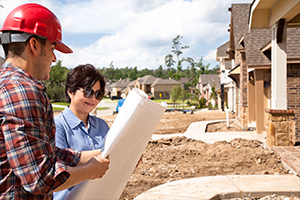In This Issue…
Housing Topic: Millennials and the Housing Market.
What to Watch For: Building Costs on the Rise.
Q&A: Interest-Only Mortgages for the Short Term.
Housing Topic:
Millennials and the Housing Market.
 Millennials are supposed to be poised as the next big wave of homebuyers. They’re reaching their mid-30s, getting married, and looking to start families. Their careers are assumed to be stable, and they’re climbing the corporate ladder with accompanying increases in pay. In sum, millennials are following the paths that their parents and their grandparents followed in the post-WWII economy. Or are they? Experts are saying that the average millennial is going to be part of the largest homebuying cohort, but millennials have defied the experts time and again.
Millennials are supposed to be poised as the next big wave of homebuyers. They’re reaching their mid-30s, getting married, and looking to start families. Their careers are assumed to be stable, and they’re climbing the corporate ladder with accompanying increases in pay. In sum, millennials are following the paths that their parents and their grandparents followed in the post-WWII economy. Or are they? Experts are saying that the average millennial is going to be part of the largest homebuying cohort, but millennials have defied the experts time and again.
When the first wave of millennials hit the streets after graduating from college, they flocked to city centers to have access to public transit and the related benefits of living in a dense, urban environment. They put off buying cars, causing pundits to proclaim that the millennial will be the car-less generation that repopulated cities. However, millennials eventually wound up buying cars as they discovered that they saved more time and spent less effort on getting from point A to point B, even in transit-rich environments. And millennials are leaving the cities for the suburbs as they find their dollar buys them more home.
Now millennials face a tough homebuying environment, wages that aren’t accelerating as fast as they were promised, are saddled with student loan debt for decades, and delaying household formation as a result. Overall, millennials have a difficult time saving money for a down-payment on a home as well as finding housing that’s affordable. The reality for many in this age group is being saddled with debt, dealing with wage stagnation, and a lack of forward movement in their career, so buying a home is made more difficult as a result.
That doesn’t mean that millennials aren’t going to buy homes — they are. But they may be more of a large wave instead of the predicted tsunami.
Sources: Business Insider, CNBC
If you have any questions regarding home loan rates or products, give me a call. I’m always happy to help.
What to Watch For:
Building Costs on the Rise.
 New home prices are on the rise as a bevy of factors put pressure on labor and material costs. Tariffs placed on Chinese goods in late spring 2019 were decried as a “$2.5 billion tax on housing” by the National Association of Home Builders. A chronic shortage of labor has resulted in higher pay for contractors, and the rising cost of land acquisition makes the base cost of a home anywhere from $20,000 to $30,000 higher than it would in a normal market. When all of these factors are combined, it makes it difficult for people to buy and for developers to build affordable housing.
New home prices are on the rise as a bevy of factors put pressure on labor and material costs. Tariffs placed on Chinese goods in late spring 2019 were decried as a “$2.5 billion tax on housing” by the National Association of Home Builders. A chronic shortage of labor has resulted in higher pay for contractors, and the rising cost of land acquisition makes the base cost of a home anywhere from $20,000 to $30,000 higher than it would in a normal market. When all of these factors are combined, it makes it difficult for people to buy and for developers to build affordable housing.
The trade wars that were started with China earlier in 2019 are having more of an impact on housing costs than the tariff on soft lumber from Canada that began in 2017. The housing market absorbed the costs of the tariffs without a major effect on housing sales. However, products from China include finishing goods such as cabinets, sinks, and even doorknobs. It does take time for the effects of tariffs to show up in the economy, and it remains to be seen how much more prices will increase if at all to gauge the overall impact on housing prices. What is certain is that the increase is being passed to homebuyers and is pushing homes out of reach for many.
When the housing bubble burst in 2008, it stopped building projects in their tracks. Laborers who couldn’t find work in the building trades shifted their focus to other professions and never returned. An emphasis on white-collar employment and a de-emphasis on working in blue-collar fields has also decreased the amount of people entering the building trades between 2008 and 2012 when the housing industry started its upturn. The end result is that there are far fewer people working as laborers and are commanding higher wages due to the shortage. Homebuilders want to build, so they pay the wages in order to gain skilled labor on their projects. This, too, is adding to the overall cost of a home.
Source: Curbed.com
I’ll continue to monitor economic reports closely, but if you have any immediate questions, please call or email today.
Q&A:
Interest-Only Mortgages for the Short Term
QUESTION: Is it a good idea to get an interest-only mortgage if I don’t intend to stay in a house for the long-term?
ANSWER: Getting an interest-only mortgage for short-term homeownership can be beneficial, especially if you’ve got a long-term financial plan, and you’re not sure if you’ll put down roots or not.
An interest-only mortgage involves paying only the interest on the mortgage. The principal balance is untouched for a period of time, and your mortgage payments are lower than they would be if you were paying mortgage and interest. The lower payments free up money that you can use for other pursuits such as investing and saving for retirement. And if you decide that you want to stay in the home for the long haul, you can keep the mortgage or refinance into a traditional loan to keep the monthly payments stable.
Source: Mortgage Calculator
We are ready to help you find the best possible mortgage solution for your situation. Contact Sheila Siegel at Synergy Financial Group today.







